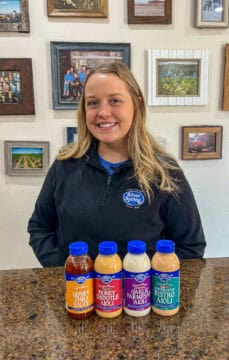
January 6, 2025
MARSHFIELD – To help pediatric patients cope with medical appointments, procedures or during a hospital stay, the Child Life and Expressive Therapies team at Marshfield Children’s Hospital is getting some help from a furry, four-legged friend – wet nose and all.
Dolly, a golden retriever mix, was recently added as an employee to the team to support that mission.
Marshfield Children’s Hospital is one of two children’s hospitals in Wisconsin to have a facility dog, Lindsey Welch, a certified child life specialist at the hospital, said.
“As far as we know, UW Health American Family Children’s Hospital in Madison is the only other children’s hospital in the state to have a (therapy) dog like Dolly,” she said.
Welch said so far, the response to Dolly has been “extremely positive.”
“So much so that we have to remind people sometimes that Dolly is here for our patients, but even our patients are so excited when they hear there’s a dog that could come and visit them and help with their procedures,” she said. “We also make sure before we go in to see patients they have no dog allergies and haven’t had a traumatic experience with dogs in the past. So far, we have not yet had anybody tell us they don’t want to see Dolly.”
Child life specialists
Welch, Dolly’s main handler, said animal-assisted therapy can help patients feel more comfortable and less anxious.
“My role helps kids who are either inpatient, hospitalized in the hospital or coming in for an outpatient medical procedure,” she said. “We do that through preparing them for what to expect.”
Welch said a good example is starting an IV on a pediatric patient.
“I’ll help them understand what an IV start is, provide distraction during the IV start and in general, help them feel a little less anxious in the medical setting,” she said. “We do a lot of advocating as well for parents to be present for things to help educate them on how they can support their child through hospitalization or a procedure, and in turn, try and help make the experience a lot better for those kids.”
Welch said one of the most rewarding parts of her job is to see kids who are especially anxious when they first come in end up having an enjoyable experience.

“It’s amazing seeing them go through the hard parts and then watching them walk out feeling empowered and proud of themselves for accomplishing something they thought was going to be really hard,” she said. “Obviously, there are difficult days, so we’re happy to make it a little bit better if we can.”
That’s where Dolly comes in, Welch said.
Easing the anxiety
Welch said Dolly is 18 months old and was received through Canine Assistance, an organization from Atlanta, Georgia.
“Christmas in July is a separate charity organization, and they raised the money for us to get Dolly through Canine Assistance,” she said. “They also raised the money for our outdoor area – we have a fence and outdoor area for Dolly to run and play between patients. Pet Supplies Plus in Marshfield is also donating services for weekly grooming and bath sessions and additional in-kind donations for special events.”
Welch said she and two other child specialists flew to Atlanta for training.
“It was me, Mackenzie Tischauser and Heidi Giese who went through training to learn how to work with Dolly in the medical setting,” she said. “Dolly is a service dog and was born and raised at Canine Assistance.”
Welch said by the time Dolly was a week old, trainers were already working with her.
“It starts with socializing them around different people, different noises and taking them out into public, that kind of thing,” she said. “When Dolly was about two months old, they assigned her (to) a foster family. She lived at night with the foster family and went on outings. They practiced several things, and she came back daily to Canine Assistance to continue her education.”
Welch said though Dolly is a golden retriever/black lab/poodle mix, “she looks like a golden retriever.”
“Those three breeds are typically used (as service animals) because of their personality,” she said. “They love to be around people and are typically very smart dogs.”
Welch said medical service dogs are used for many different reasons.
“Maybe an individual has diabetes, so they teach those dogs to smell when their blood sugar drops, and then they can alert their handler,” she said. “Maybe a child has epilepsy or seizures. Dolly is very smart herself. She doesn’t specifically help us alert any one specific thing for these patients but more can help us teach our patients.”
Welch said Dolly isn’t afraid to “get up close and personal” with young patients.
“Let’s say we have a kiddo coming in for an MRI,” she said. “We can take Dolly into the MRI room and have her get up on the bed. She’s a tool we use to help teach our patients about what they’re going to experience. The example I used before about the IVs, she’s done quite a few of those already where she jumps up on the bed with them, and she lays in their lap and they get to pet her.”
Welch said Dolly kind of acts like a weighted blanket.
“Her weight seems to comfort patients, and then we can have a conversation around Dolly to help keep them distracted while the IV is being placed,” she said.
Welch said Dolly is working with a rehab patient now who is motivated by animals.
“He loves animals, so we’re allowing him to throw Dolly a ball to work on some of his gross motor skills – sometimes his therapy sessions can be really tough on him,” she said. “Dolly will snuggle up in the bed afterward and help him calm down.”
It’s time for work
Welch said Dolly has learned that when she has her vest on, she has to be calm.
“You can definitely tell her demeanor changes, but her tail gets really straight up in the air, and she’s wagging it hard,” she laughed. “She definitely loves the work she does, but you can also tell when she needs a break, too. We usually try and get her a break after she sees a couple of patients – get her outside where she can run and play. She absorbs all that stress from the patients and the kids, and her way of release is running and chasing the ball in her backyard area.”

Because Dolly is an employee of Marshfield Children’s Hospital, Welch said she will also get vacation days.
“Just like humans, it’s good for her to have vacations, too,” she said.
Because Welch and Dolly spend so much time together, she said their bond is special.
“Even at home, she wants to be wherever people are,” she said. “Wherever I am, she definitely wants to be by me. She’ll curl right up next to me, she’ll be by me if I’m making dinner, and she’ll make sure she’s laying on my feet at work. If it’s her rest time, she doesn’t want to lie on her bed across the office floor – she wants to be underneath my feet. She is a sweetheart, so I’m not sure who loves who more.”
Welch said a typical golden retriever’s life span is about nine to 10 years.
“Once they start slowing down at the end of life where they’re not able to walk as far distances and jump up on the bed as much, then we’ll start talking to Canine Assistance about maybe decreasing her workload a little bit before she’s fully done,” she said. “We want to make sure we’re not overworking her at any point in time.”
Barriers
If having a service dog is so effective, why aren’t other children’s hospitals doing it?
Welch said funding is a big part of it.
“Canine Assistance is a 501(c)(3), so they don’t charge for the dogs, but we gave them $30,000 for them to use that money to place another dog with another child,” she said. “They’re not going to tell you that you have to pay, but that’s kind of the general rule of thumb that you pay $30,000.”
The other barrier, Welch said, is you have to have a handler willing to take the dog home – in this case, Dolly.
“Dolly lives with me, and then she visits the other handlers about once a month or so,” she said. “The handler has to house the dog and use them in their everyday practice.”
Keeping in mind Dolly is a service dog, Welch said she can’t let her get away with bad habits when she’s at home with her – “like jumping at people and things like that.”
“I really can’t treat her like you would any other dog or pet because again, her primary role is working in the hospital setting, so she needs to adhere to all those guidelines,” she said.
Dolly is considered a member of the Child Life team, Welch said, and is treated like an employee.
“She is required to take breaks and is only allowed to work 40 hours a week,” she said. “Dolly is our No. 1 priority when we’re with patients, so if there is a patient who would become agitated where we think Dolly could get hurt, in that situation, we would have to leave that patient and take Dolly out to ensure her safety.”
 A menagerie of alpacas, llamas, porcupines, more
A menagerie of alpacas, llamas, porcupines, more Silver Spring Foods launches Signature Sauce Line
Silver Spring Foods launches Signature Sauce Line








